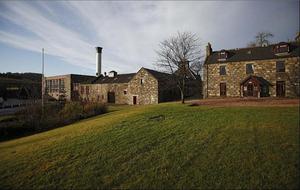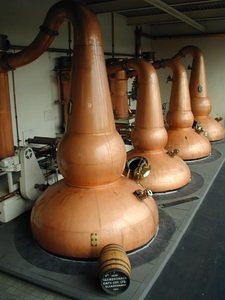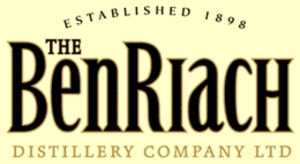|
|
Release Notes
A dense, heavily-sherried dram from a distillery now producing again after a six-year layoff. A malt best suited to after-dinner sipping
The Whisky Exchange
3rd Party Tasting Notes
Nose: Wow! Classic with coal smoke and a good dose of fruits & sherry. Something slightly farmy. Spices. Loads of character; reminds me of a whisky made in the 1980's. Some candied fruits in the background. Bubblegum? Diesel? Quite complex. Whiff of rubber in the background? Not extremely sherried though... Turkish delight. The oriental spices and tertiary fruits grow stronger over time. Beer? Organics. Some oil?
Taste: Fruity and powerful with a touch of smoke in the finish. Feels slightly chalky & gritty in the end. Just like the nose, it resembles an 'antique' style of malt whisky. The smoke leans in a rubbery direction. A very nice fruity balance. My kind of style, but the mouth feel betrays the relatively young age.
Score: 84 points - up from an initial score of 83. Quite good whisky, considering the 45 Euro's price tag.
With a sweeter, 'fatter' finish it could have easily reached the upper 80's.
Taste: Fruity and powerful with a touch of smoke in the finish. Feels slightly chalky & gritty in the end. Just like the nose, it resembles an 'antique' style of malt whisky. The smoke leans in a rubbery direction. A very nice fruity balance. My kind of style, but the mouth feel betrays the relatively young age.
Score: 84 points - up from an initial score of 83. Quite good whisky, considering the 45 Euro's price tag.
With a sweeter, 'fatter' finish it could have easily reached the upper 80's.
Malt Madness
Colour: full gold.
Nose: oh, once again it seems obvious to me that the new Glendronachs do fill the seats left vacant by The Macallan a few years ago. Seriously, this is very close to the 'old 12' in style, with that very peculiar blend of maltiness and sherriness with some very pleasant notes of yellow flowers plus toasted brioche and orange marmalade. It's also obvious that it's much better composed than the older Glendronach 12 'Original' that wasn't very inspiring in my opinion.
Mouth: syrupy, much bigger than '40%' and probably more complex than on the nose, which is quite an achievement at such young age (but again, is 12 still young?) Big honey and apricot jam, ripe yellow plums, then notes of sherry, milk chocolate and a little Cointreau plus drops of Bailey's (I'm really sorry). Extremely coherent and superlatively drinkable.
Finish: unexpectedly long and big, with quite some spices kicking in. Pepper and cloves. Bailey's is back in the aftertaste.
Comments: sure it's no very complex whisky but it's perfectly balanced despite its richness and relative thickness. Recommended.
Rating: 86 points.
Nose: oh, once again it seems obvious to me that the new Glendronachs do fill the seats left vacant by The Macallan a few years ago. Seriously, this is very close to the 'old 12' in style, with that very peculiar blend of maltiness and sherriness with some very pleasant notes of yellow flowers plus toasted brioche and orange marmalade. It's also obvious that it's much better composed than the older Glendronach 12 'Original' that wasn't very inspiring in my opinion.
Mouth: syrupy, much bigger than '40%' and probably more complex than on the nose, which is quite an achievement at such young age (but again, is 12 still young?) Big honey and apricot jam, ripe yellow plums, then notes of sherry, milk chocolate and a little Cointreau plus drops of Bailey's (I'm really sorry). Extremely coherent and superlatively drinkable.
Finish: unexpectedly long and big, with quite some spices kicking in. Pepper and cloves. Bailey's is back in the aftertaste.
Comments: sure it's no very complex whisky but it's perfectly balanced despite its richness and relative thickness. Recommended.
Rating: 86 points.
Whisky Fun
Nose: Heather. Vanilla. Scented cream toffee. Lots of bourbon.
Palate: Silky smooth. Clean, creamy. Shortbread.
Finish: Crisp, with balancing nutty dryness from winey sherry notes.
Comment: A very enjoyable whisky, but somewhat lacking in liveliness.
Rating: 7.75/10
Palate: Silky smooth. Clean, creamy. Shortbread.
Finish: Crisp, with balancing nutty dryness from winey sherry notes.
Comment: A very enjoyable whisky, but somewhat lacking in liveliness.
Rating: 7.75/10
Michael Jackson, Whisky Magazine #39
Nose: Oak, Autumn fruits: medlar, pear, orange crates, vanilla pod, butter toffee. In time a nuttiness takes over.
Palate: A silky feel, pecan pie, soft fruits, nutty maltiness (pecan). Becomes almost vinous with water.
Finish: Firms. Nut bowl.
Comment: A welcome return.
Rating: 7.75/10
Palate: A silky feel, pecan pie, soft fruits, nutty maltiness (pecan). Becomes almost vinous with water.
Finish: Firms. Nut bowl.
Comment: A welcome return.
Rating: 7.75/10
Dave Broom, Whisky Magazine #39
The Distillery: GlenDronach
| Established: 1826 |
| Silent since: False |
| Address: Forgue near Huntley, Aberdeenshire, Scotland, AB54 6DB, UK |
| → website |
The Glendronach distillery in the Deveron (Speyside) area of Scotland was founded in 1826 by Glendronach Distillery Co., a partnership headed by one James Allardes (or Allardyce).
2005 was an important year for Glendronch in another respect as well; its owners Allied Domecq were acquired by Pernod Ricard who became Scotland"s second largest whisky producer this way.
Glendronach by Murray McDavid
That was when the Glendronach distillery was mothballed for a few years by owners Allied Distillers - formerly known as Allied Breweries and later as Allied Domecq. For- tunately, the distillery went into full production again in 2002. Initially they resumed the traditional coal firing of the stills, but in 2005 the distillery shut down for a few months to be converted from direct coal firing to internal steam heating. So, one of the very last coal fired distilleries that was operational in the third millennium didn"t actually use the technique for more than three years after the re-opening in 2002. Just when the first of the "2002" spirit turned into whisky they abandoned coal.
Another significant change in the production process took place in 1996 when the floor maltings at Glendronach were decommissioned. Because they used a combination of peat and coal to dry the malted barley, spirit that was distilled before the distillery was mothballed was relatively peaty for a Speyside whisky. At a peating level of up to 14 PPM it wasn"t a "peat monster" like Laphroaig or Lagavulin, but the whisky was a little more potent than the stuff they produced at nearby distilleries like Knockdhu. Nowadays Glendronach buys unpeated malt.
Just one decade after it was founded, Glendronach was destroyed by a fire - a fate that was not that unusual for the whisky distilleries at the time. After the disaster several people from the whisky industry became involved, including Walter Scott (from Teaninich), Alexander Ross and "Captain" Charles Grant (younger son of William Grant of Glenfiddich distillery). Glendronach remained under control of that branch of the Grant family until 1960, when George Grey Grant sold it.

The Glendronach distillery was sold to William Teacher & Sons Ltd. - who themselves became part of Allied in 1976. Teacher"s expanded the number of stills from two to four In 1966 and "67. The (almost) unique thing about those stills was the fact that they were all coal fired - as opposed to the "indirect" heating (often by steam) that is used at most other malt whisky distilleries. In fact, together with the Glenfarclas and Springbank distilleries, Glendronach was one of the very last coal fired distilleries that were operational in the third millennium. That"s quite amazing, if you think about it - well at least to a whisky nerd like myself. Until recently coal was used to dry the malted barley on Glendronach"s own floor maltings as well (along with peat), but those floors were decommissioned in 1996.
Pernod Ricard isn"t threatening Diageo"s position as Scotland"s largest producer of malt whisky, but they managed to produce 2/3 of Diageo"s output with less than half the number of distilleries; 12 as opposed to 27.
But in that respect, the #3 malt whisky producer is doing an even better job. With only three distilleries (Balvenie, Glenfiddich and Kininvie) William Grant manages to produce roughly half of the malt whisky that Pernod Ricard makes with its dozen distilleries.
2002 - After Glendronach was mothballed in 1996 by Allied Distillers, it was re-opened again on May 14, 2002.
2005 - Pernod Ricard / Chivas Brothers buys Allied Domecq and acquires the Glendronach distillery this way. In the same year, Glendronach is the last malt whisky distillery in Scotland to be converted from direct coal firing to indirect steam heating. In the same year a new 33 years old official bottling is launched.
2008 - Billy Walker and partners (owners of the BenRiach distillery) acquire the Glendronach distillery.

2009 - The old core range of 12yo, 15yo and 18yo is relaunched, along with several single cask bottlings.
But now I"m getting side-tracked again - the topic was Glendronach... The distillery has been on my purely personal distillery Top 10 for quite a few years, thanks to the excellent yet affordable 15yo "100% Sherry" malt whisky that was available in the 1990"s. However, most official releases from the early noughties were vattings of sherry and bourbon casks, that didn"t tickle my fancy quite as vigourously. Pernod Ricard has only used bourbon casks since they re-opened Glendronach distillery in 2005, but fortunately Glendronach was purchased by The Benriach Distillery Company Ltd. in 2008. Based on the great job they did when they put the Benriach distillery on the map again, I had high hopes for the release of some exciting new bottlings after the take-over - and I was right. In 2009 the new owners of Glendronach released a new "core range" of three different expressions; a 12yo, a 15yo and an 18yo.
I"m a sucker for a heavily sherried or peated single malt whisky with lots of character. The often subtle differences between the hundreds of different single malt whiskies from ex-bourbon casks that are released every year don"t excite me quite as much as they once did. So, after the take-over of the Glendronach distillery by Pernod Ricard it soon disappeared from my top 10.
However, after Billy Walker and his gang took control of Glendronach, they soon released three new standard OB"s that were all matured in sherry casks. The release of these beauties brought the Glendronach distillery right back in my personal distillery top 10 - and on one of the top positions. And as long as they have sufficient stocks of ex-sherry casks to keep releasing these sherried whiskies at fairly fair prices, they could very well stay on that top 10 forever...
In the new Millenium
Trivia:
- In 2009 the new owners announced a total investment of 7 million GBP in the Glendronach distillery.
- Glendronach distillery aimed to produce over 1,000,000 litres of alcohol in 2010.
from Malt Madness
The Owner: BenRiach Distillery Company
| Established: 2003 |
| Silent since: False |
| Address: Glenbervie Business Park, Larbert, Stirlingshire FK5 4RB, UK |
| → website |
In 2008 BenRiach Distillery Co.Ltd. purchased Glendronach distillery once again from Pernod Ricard"s Chivas Brothers.
The company also produces 2 export-only blended Scotch Whisky brands: Clan Murray and Glen Bervie.

BenRiach Distillery Co.Ltd. was founded by Scotch whisky industry veteran Billy Walker and South African Intra Trading (Geoff Bell and Wayne Keiswetter). The consortium bought the mothballed Benriach distillery from Pernod-Ricard"s Chivas Brothers in 2004 and reopened it under the slightly tweaked name "BenRiach".
from The Internets
